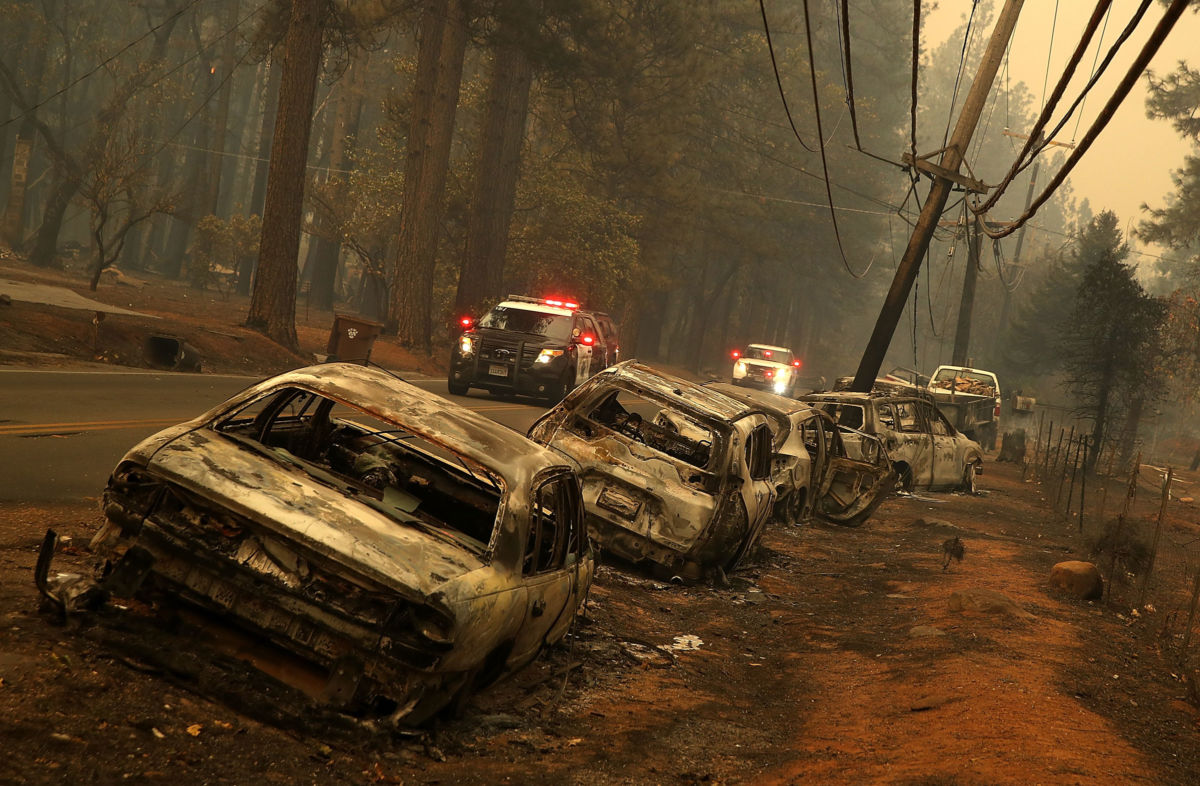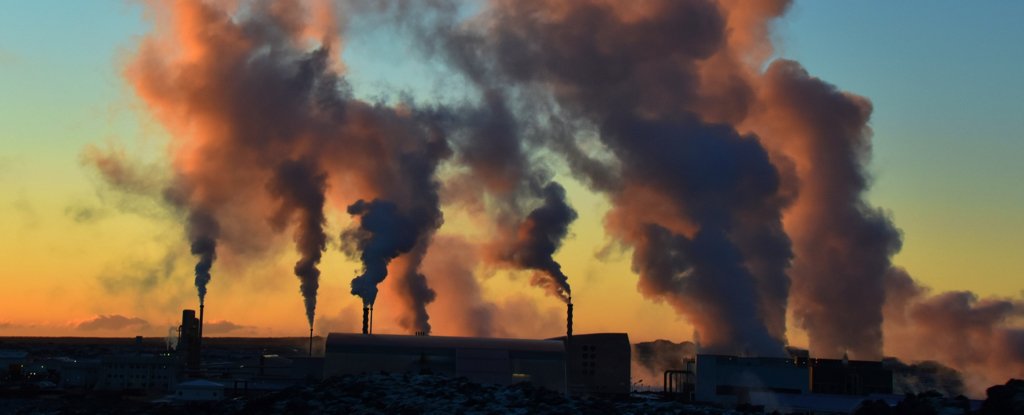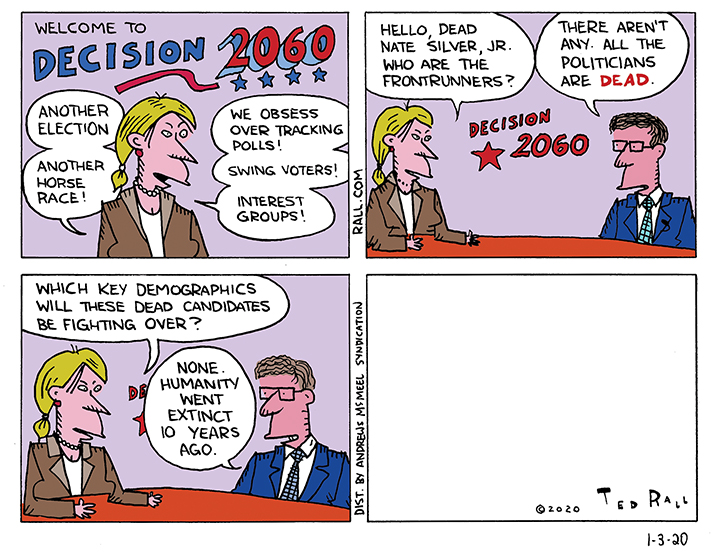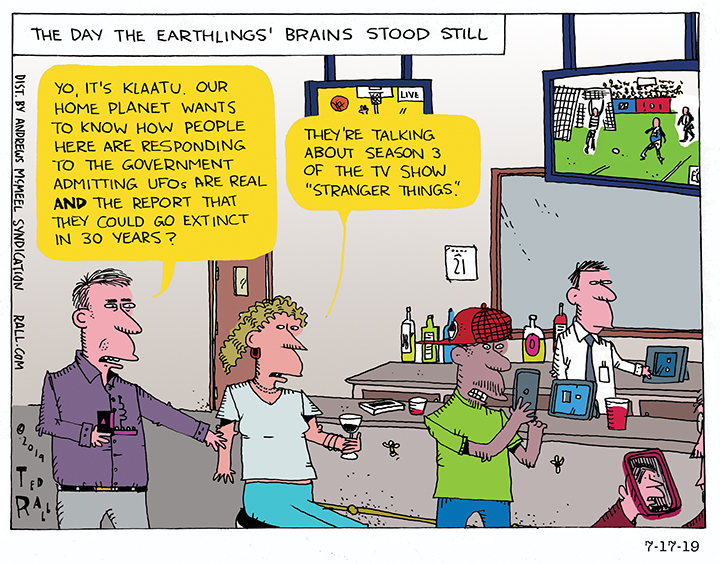DMZ America Podcast #152: What If a Huge Asteroid Was About to Smash into the Earth? How Would Humans React? Debate Primer, Religion in Politics
Internationally-syndicated Editorial Cartoonists Ted Rall (from the left) and Scott Stantis (from the right) discuss the pressing issues of the day.
First up, there is an asteroid headed for the Earth and will pass the closest to our planet in the history of our species. Happily, the asteroid will miss us but how would humanity react if the next time we weren’t so lucky? Ted and Scott reveal their sense of how our species would respond.
Next, Ted and Scott handicap the upcoming presidential debate. With a combined 80 years of experience observing and commenting on presidential politics they project what each candidate needs to accomplish and what the risks are for both.
Lastly, with the Ten Commandments law enacted in Louisiana, the question of the separation of church and state is more pressing than ever.
A Grim New Definition of Generation X

People born in the 1960s may be the last human beings who will get to live out their full actuarial life expectancies.
“Climate change now represents a near- to mid-term existential threat” to humanity, warns a recent policy paper by an Australian think tank. Civilization, scientists say, could collapse by 2050. Some people may survive. Not many.
Some dismiss such purveyors of apocalyptic prognoses as hysterics. To the contrary, they’re Pollyannas. Every previous “worst-case scenario” prediction for the climate has turned out to have understated the gravity of the situation. “Paleoclimatologists have shown that past warming episodes show that there are mechanisms which magnify its effects, not represented in current climate models from the Intergovernmental Panel on Climate Change to the Paris Accords,” reports The Independent. It’s probably too optimistic to assume that we’ll make it to 2050.
Gives new meaning to Generation X.
Millennials and the children we call Generation Z face the horrifying prospect that they will get stuck with the tab for humanity’s centuries-long rape of planet earth, the mass desecration of which radically accelerated after 1950. There is an intolerably high chance that today’s young people will starve to death, die of thirst, be killed by a superstorm, succumb to a new disease, boil to death, asphyxiate from air pollution, be murdered in a riot or shot or blown up in a war sparked by environmentally-related political instability long before they survive to old age.
Long threatened, never taken seriously, not even now that it’s staring us right in the face, human extinction is coming for the children and grandchildren we claim to love but won’t lift a finger to save.
Shelves sag under the weight of books that have been written arguing that we still have a chance to save ourselves. I wish I could believe that. Human population has tripled since the 1950s. More than a million species have gone extinct. Ninety percent of the fish in the ocean have vanished, replaced by one billion tons of plastic. Two-thirds of the trees have been cut down. The polar ice cap is gone; it’s never coming back.
We can’t stop global warming. An increase of four degrees Celsius over the baseline set at the beginning of the Industrial Revolution means game over. We’re well on our way there. It doesn’t make sense to think that we can avoid extinction.
What if we woke up and demanded action from our political leaders? Radical problems require radical solutions; only the most radical of solutions could resolve the most radical problem of ruining our planet’s ability to sustain us: revolution. We would have to rise up and abolish—immediately—consumer capitalism in all the major greenhouse gas-producing nations, prioritize cleaning the environment as the human race’s top concern, and pivot to an economic mindset in which we extract the bare minimum from the ecosystem that we need in order to survive and nothing more.
Voting might achieve some incremental reforms but reform falls far short of what we require. Saving our young people (and their children, should they be foolish enough to have any) would require global revolution, the violent overthrow of the ruling elites and replacing them with people who understand what must be done. It would need to happen today. Fifty years ago would be better. Got a time machine?
None of this is going to happen. We are going to sleepwalk to our doom in a haze of social media and corporate entertainment distraction.
So it’s time for people who are younger than I am to start thinking about how they want to spend the rest of their likely-to-be-truncated lives, and how they plan to face mass premature death.
Pending human extinction destroys the answers provided by religion and philosophy. Knowing that there won’t be anyone to know that we were ever here raises the question: why bother to do anything? This column, this year’s “important” presidential election, love, hate, everything will lose its meaning when the last member of our species draws her last breath. Earth is unlikely to be visited by an alien archaeologist, much less uncover everything we’ve made and created (assuming any of it survives), much less figure out what any of it meant, before the sun expands into a red giant and ends it all.
Much is to be said for hedonism: eat, drink, have sex, and don’t bother to sort your recycling, for tomorrow we die. Stoicism has its advantages too; go out with dignity rather than weeping and gnashing your teeth and making your fellow survivors miserable.
Nihilism is about to become the best worst possible life strategy. Life is meaningless. That will soon become obvious. Moral principles, relics of a time with a future, will blow away like the irradiated dust we leave behind.
None of this will have mattered.
(Ted Rall (Twitter: @tedrall), the political cartoonist, columnist and graphic novelist, is the author of “Francis: The People’s Pope.” You can support Ted’s hard-hitting political cartoons and columns and see his work first by sponsoring his work on Patreon.)
Left, Center and Right: We’re All in Denial About Climate Change
 The political left, center and right do share something in common in today’s polarized America: we’re all in denial. The first step in 12-step programs begins with admitting that you have a problem for a reason: you can’t tackle a challenge whose existence you refuse to acknowledge. “From a psychoanalytical viewpoint, denial is a pathological, ineffective defense mechanism,” doctors M.S. Vos and J.C. de Haes observed in their 2006 study of cancer patients. A stunning 47% of the patients they polled denied that they had cancer! Denial reduced their chances of seeking treatment and then following through.
The political left, center and right do share something in common in today’s polarized America: we’re all in denial. The first step in 12-step programs begins with admitting that you have a problem for a reason: you can’t tackle a challenge whose existence you refuse to acknowledge. “From a psychoanalytical viewpoint, denial is a pathological, ineffective defense mechanism,” doctors M.S. Vos and J.C. de Haes observed in their 2006 study of cancer patients. A stunning 47% of the patients they polled denied that they had cancer! Denial reduced their chances of seeking treatment and then following through.
“On the other hand,” Vos and de Haes observed, “according to the stress and coping model, denial can be seen as an adaptive strategy to protect against overwhelming events and feelings.” Denial lets you feel better.
We think of climate change denial as a right-wing phenomenon. Indeed, only 56% of Republicans accept the scientific consensus that the earth is heating up; fewer still believe that humans are responsible, compared to 92% of Democrats who agree with scientists.
Those who deny that climate change is real are engaging in what psychologists call “simple denial.” But those on the left aren’t much better. Liberals who think global warming is real often resort to “transference denial”: they blame the right and corporate polluters even though we’re all responsible. The scale of the climate crisis and the level of sacrifice and disruption that would be necessary to mitigate it feels overwhelming. A widely-reported analysis predicted that human civilization will collapse in 30 years. Others say it’s already too late to save ourselves.
“We’re doomed,” predicts Mayer Hillman, a senior fellow emeritus at University of Westminster’s Policy Studies Institute. “The outcome is death, and it’s the end of most life on the planet because we’re so dependent on the burning of fossil fuels. There are no means of reversing the process which is melting the polar ice caps. And very few appear to be prepared to say so.”
He’s probably right.
Bernie Sanders recently proposed the most ambitious assault on greenhouse gas emissions ever floated in U.S. politics, a $16.3 trillion plan to transition out of carbon-based fuels by 2050. By that time, though, we’ll be dead.
As aggressive as Sanders’ plan is, it doesn’t go nearly far enough or fast enough. Yet Republicans and some Democrats say it’s too expensive. No one in corporate media is taking Sanders’ idea seriously. It’s stillborn.
Liberals post their concern to social media. Some even attend protest marches. But they’re hardly acting like we face an existential crisis.
The 16-year-old Swedish climate activist Greta Thunberg told world leaders: “I don’t want you to be hopeful, I want you to panic. I want you to feel the fear I feel every day and then I want you to act.”
Panic? Our “leaders” don’t give a crap. They’re too bought and too stupid to act.
The bird population in the U.S. has collapsed by 29%—a total of 2.9 billion fewer birds—over the last 50 years. During that same period we lost half the world’s fish. Insects are on the way out too. “No insects equals no food, [which] equals no people,” says Dino Martins, an entomologist at Kenya’s Mpala Research Centre.
None of this should come as a surprise. We were warned. “The oceans are in danger of dying,” Jacques Cousteau said in 1970. Life in the oceans had diminished by 40 percent in the previous 20 years.
If you really believe that the planet is becoming uninhabitable, if you think you are about to die, you don’t march peacefully through the streets holding signs and chanting slogans begging the corrupt scoundrels who haven’t done a damn thing for decades to wake up and do something. You identify the politicians and corporate leaders who are killing us, you track them down and you use whatever force is necessary to make them stop. Nothing less than regime change stands a chance of doing the job.
Nothing else—the struggle for income equality, gun control, abortion—matters as much as attacking pollution and climate change.
Anything short of revolution and the abolition of consumer capitalism is “minimizational denial“: admitting the problem while downplaying its severity. Anything short of a radical retooling of the global political system that establishes state control of the economy with environmental impact as our first, second and third priorities is a waste of time that dooms the human race to extinction.
There is no middle ground, no splitting the difference, no compromise. “Good enough” isn’t good enough. Mere progress won’t cut it. Human survival is a pass-fail class. The final exam is tomorrow morning—early tomorrow morning.
Time to get serious, godammit.
(Ted Rall (Twitter: @tedrall), the political cartoonist, columnist and graphic novelist, is the author of “Francis: The People’s Pope.” You can support Ted’s hard-hitting political cartoons and columns and see his work first by sponsoring his work on Patreon.)
The Day the Earthlings’ Brains Stood Still
Two blockbuster stories broke at nearly the same time: The US Air Force confirmed that UFOs are real and released official video proving it. And a report came out indicating that humans might go extinct by the year 2050 unless something dramatic happens. Weirdly, no one is talking about either story.
Don’t Worry, the Government Will Solve Climate Change Even Though They Can’t Solve Anything Else
What it comes to climate change, most Americans think to themselves: someone will figure something out. And by someone, they probably mean the government. But this is the very same government that doesn’t seem to be able to address almost any other problem, most of which are much less complicated than climate change.




